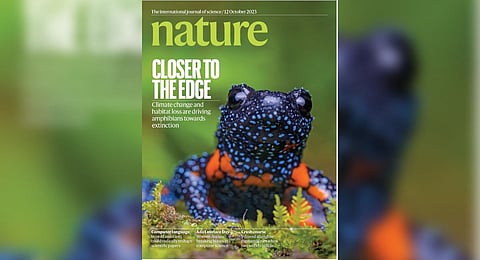

KOZHIKODE: Since its inception in 1869, ‘Nature’ magazine, the world’s leading multidisciplinary science journal, has featured peer-reviewed research and studies by global luminaries and experts in various academic disciplines. The latest edition does good by Kerala, featuring research papers and articles that four experts from the state -- Dr Sandeep Das, Dr S D Biju, Dr Ranjith P Anand, and Dr Thekkumkara Surendran Anish -- worked on.
Sandeep and Biju co-authored a research paper titled, ‘Ongoing declines for the world’s amphibians in the face of emerging threats’. Ranjith appears as the lead author of the article ‘Design and testing of a humanized porcine donor for xenotransplantation’. Anish, who played a lead role in the state Nipah surveillance team and is currently a professor of epidemiology at Manjeri Government Medical College Hospital, published an article in the ‘World View’ section of the journal.
Speaking about his article, with the rubric ‘A personal take on science and society’, Anish said, “Based on my experience as one of the leaders of the Nipah surveillance team in Kerala during the 2018 and 2023 outbreaks, more scientific and policy work on the disease is required. As a key step, all countries likely to have Nipah reservoirs should have early detection systems.
That starts with knowing better where the risks lie,” he said. “The strain in Kerala’s outbreaks originated from Bangladesh in 2001. Health systems have missed this strain as its mortality rate is so high that it often causes small outbreaks or single cases. Outbreaks in Bangladesh in 2001 and 2003 were detected later, when antibodies against Nipah were found in stored samples,” he said.
The article Anand cooperated on explored the promise of porcine organs for human transplantation. A porcine donor was engineered and its xenografts were successfully tested in nonhuman primates. The research states that these results show that preclinical studies of renal xenotransplantation could be conducted in nonhuman primates and bring us closer to clinical trials of genetically engineered porcine renal grafts.
The global study involving Sandeep and Biju, from Thrissur and Thiruvananthapuram respectively, found that around 43.5% of amphibian species in Kerala are at risk of extinction. TNIE published an article on the study in its October 22 edition. Sandeep who is a SERBnational post-doctoral fellow with the zoology department of Calicut University, said, “We were able to point out the threat to the population of amphibians in Kerala. Out of 230 amphibian species identified in the Western Ghats, 106 are categorised as threatened.”